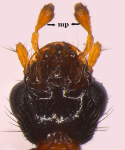Scientific name
Paederus fuscipes Curtis
Taxonomic position
Coleoptera: Polyphaga: Staphylinidae
Diagnosis
Length: 6.5-7.0 mm. Body elongate, dorsal side covered with numerous, fine, erect black setae; head more or less constricted posteriorly. Head and last two abdominal segments black, pronotum and
first four visible abdominal tergites reddish-orange, elytra dark metallic blue, short, truncated and pad-like; mandibles and palpi testaceous, apex of third segment infuscate. Antennae 11-segmented, filiform, first 3-4 segments reddish brown, remainder darker, brown. Legs reddish brown, apices of femora, tibiae and tarsi darker brown. Maxillary palpi 4-jointed, moderately long, I segment small, II elongate, apically slightly thickened, III longer, obconical, IV small, obtuse, nearly as broad as the apex of III. Labial palpi 3-segmented, the last segment small and pointed. Elytra of normal length or reduced in apterous forms. Abdominal apex with a pair of stout spines. Tarsi 5-segmented.
 Head, ventral view (mp - Maxillary palpi) Head, ventral view (mp - Maxillary palpi)
Images
Distribution
Widely distributed in several parts of the world.
Biology / Hosts
Both adults and larvae are predatory on several crop pests throughout the world. Commonly collected on crops such as rice, maize, and sorghum. The adults are known to cause contact dermatitis on human beings in several parts of the world (Armstrong & Winfield, 1969).
References
- Armstrong, R.K. & Winfield, J.L. 1969. Paederus fuscipes dermatitis: an epidemic on Okinawa. The American Journal of Tropical Medicine and Hygiene, 18: 147-150.
- Cameron, M. 1931. The Fauna of British India, including Ceylon and Burma. Coleoptera. Staphylinidae - Vol. II. Taylor and Francis, London. 257 p.
- Devi, P. K., Yadav, D. N., & Jha, A. 2002. Biology of Paederus fuscipes Curtis (Coleoptera: Staphylinidae). Pest Management and Economic Zoology, 10 (2): 137-143.
- Devi, P.K., Yadav, D.N. & Jha, A. 2003a. Predatory behaviour and feeding potential of Paederus fuscipes. Indian Journal of Entomology, 65(3): 319-323.
- Devi, P.K., Yadav, D.N. & Jha, A. 2003b. Seasonal occurrence and association of Paederus fuscipes with different host plants at Anand, Gujarat. Indian Journal of Entomology, 65(1): 67-75.
|